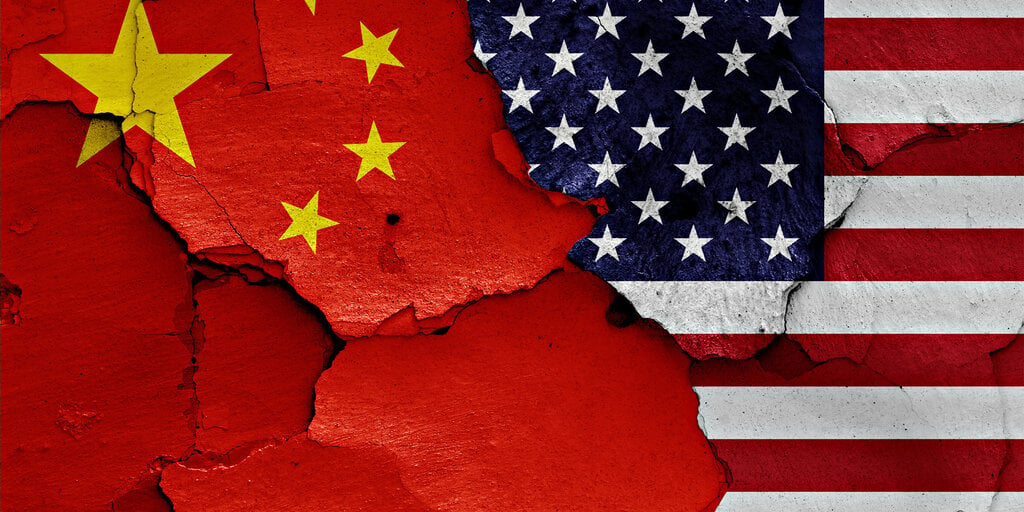Tron founder Justin Sun has urged China to reassess its position on Bitcoin, following former President Donald Trump’s endorsement of the digital currency and plans to make the U.S. the world crypto capital.
Trump pledged to create a “strategic Bitcoin stockpile” for the U.S. during his keynote address at the Bitcoin 2024 conference in Nashville on Saturday.
“As the final part of my plan today, I am announcing that if I am elected, it will be the policy of my administration, the United States of America, to keep 100% of all the Bitcoin the U.S. government currently holds or acquires into the future,” Trump stated. “I hope you do well.”
Responding to Trump’s comments, Sun, a prominent figure in the crypto world, said competition between the two countries is likely to benefit the entire industry.
“China also needs to step up. Since President Trump pushed for Bitcoin, U.S. policies have warmed. China should make further progress in this area. Competition between China and the U.S. in Bitcoin policy will benefit the entire industry,” Sun said on Twitter.
China 🇨🇳 also needs to step up. Since President Trump pushed for Bitcoin, U.S. 🇺🇸 policies have warmed. China should make further progress in this area. Competition between China and the U.S. in Bitcoin policy will benefit the entire industry. 👏
— H.E. Justin Sun 孙宇晨 (@justinsuntron) July 28, 2024
This statement comes against the backdrop of China’s historically stringent stance on cryptocurrencies.
The country, once a global leader in Bitcoin mining and trading, has implemented some of the world’s most restrictive policies on digital currencies in recent years.
In 2013, the country emerged as a powerhouse in the crypto space, with Chinese miners accounting for more than 70% of the Bitcoin network’s mining power by 2017.
However, September 2017 marked a turning point when the government banned Initial Coin Offerings (ICOs) and ordered the closure of domestic cryptocurrency exchanges.
Despite these initial restrictions, mining operations continued to thrive in China due to cheap electricity—particularly in regions like Inner Mongolia, Xinjiang, and Sichuan. This allowed China to maintain its dominance in the global crypto mining landscape for several years.
However, the situation changed dramatically in 2021. In May of that year, Chinese Vice Premier Liu He announced a sweeping crackdown on Bitcoin mining and trading.
This was followed by a series of regulatory actions, culminating in September 2021 when the government declared all cryptocurrency transactions illegal, effectively banning mining nationwide.
The Chinese government cited several reasons for this hardline approach, including concerns over financial stability, environmental impact due to mining operations’ high energy consumption, prevention of capital flight, and the desire to maintain control over the financial system.
The impact of China’s ban was felt globally.
The Bitcoin network’s hash rate dropped by over 50% temporarily, and there was a mass exodus of mining operations to countries like Kazakhstan, Russia, and the United States.
While cracking down on decentralized cryptocurrencies, China has been actively developing its own Central Bank Digital Currency (CBDC), the digital yuan.
This state-controlled digital currency is seen as a way for China to modernize its monetary system while maintaining oversight of financial transactions.
Sun’s call for China to “step up” in the realm of Bitcoin policy represents a significant challenge to this status quo, suggesting that China risks falling behind in the global race for cryptocurrency adoption and innovation if it maintains its current prohibitive stance.
Industry experts suggest that a shift in China’s Bitcoin policy could have far-reaching implications for the global cryptocurrency market.
“The U.S., especially under President Trump and following administrations, has shown growing support for Bitcoin, establishing itself as a leader in the global crypto space. If China were to take a similar path, it could lead to healthy competition between the two economic powerhouses,” Anndy Lian, author and intergovernmental blockchain expert told Decrypt. “This competition could lead to advancements in blockchain technology, better regulatory frameworks, and broader cryptocurrency adoption.”
He added that the global market would benefit from increased liquidity, enhanced security measures, and stronger infrastructure. Additionally, balanced regulations in both countries could help mitigate risks related to volatility and fraud, increasing investor confidence.
Edited by Stacy Elliott.
Daily Debrief Newsletter
Start every day with the top news stories right now, plus original features, a podcast, videos and more.


